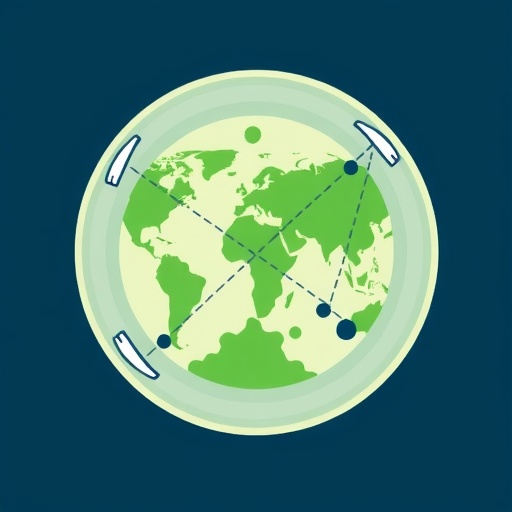The complex relationship between economic growth and well-being has become a focal point for researchers and policymakers alike, particularly in the realm of sustainable development. As societies grapple with the challenges posed by climate change and inequality, the pursuit of well-being through economic expansion raises numerous questions about effectiveness and ethics. A groundbreaking study by Miar published in the journal Discover Sustainability explores the intricate role of social factors in bridging economic progress with enhanced societal well-being while ensuring sustainable development.
The study emphasizes that mere material wealth does not equate to well-being; rather, social structures and networks play a pivotal role in shaping an individual’s quality of life. Wealth distribution, access to education, healthcare, and social cohesion are crucial variables that influence overall well-being. The idea that economic metrics must be complemented with social indicators underscores a paradigm shift in how we measure progress in society.
Miar’s research highlights the importance of integrated frameworks that consider not just economic outputs but also the social fabrics of communities. Traditional metrics such as Gross Domestic Product (GDP) are deeply flawed when measuring well-being, as they fail to capture the nuances of happiness, health, and satisfaction that emerge from social interactions and societal values. Thus, the integration of social factors into economic planning is not merely advisable but essential for long-term sustainability.
The study further argues that social factors are not merely a backdrop to economic activities but rather an integral component that dictates the success of economic initiatives. Communities with stronger social ties tend to exhibit lower crime rates, higher educational achievements, and improved health outcomes. This correlation suggests that economic strategies must prioritize the enrichment of social bonds alongside financial growth to create holistic benefits for society.
Moreover, the research emphasizes that achieving well-being through economic growth requires a multifaceted approach. It is essential to adopt policies that foster inclusivity, ensuring that all community segments benefit from economic advancement. The recommendation encompasses targeted interventions in low-income areas, focusing on education, job training, and accessible healthcare, thereby enabling vulnerable populations to participate in the economic landscape meaningfully.
Miar also discusses the role of government in facilitating this synergy between economic growth and social well-being. Policymakers are urged to craft strategies that bolster social capital, which in turn can act as a catalyst for economic dynamism. Programs promoting community engagement, volunteerism, and grassroots organizations are suggested as vital mechanisms to weave social factors into the economic fabric of development.
As countries emerge from the constraints imposed by the COVID-19 pandemic, there lies a unique opportunity to reassess priorities and redefine success in terms of well-being rather than just economic expansion. Miar posits that this reassessment could lead to innovative economic models that are sustainable, equitable, and designed to enhance the quality of life for all citizens. The author shares a compelling vision of future economies that thrive on collaboration and cohesive societal structures.
The findings of the study advocate for substantial investment in social infrastructure, paralleling investments in traditional economic sectors. By prioritizing health, education, and social equity, nations could nurture environments where individuals contribute productively and flourish personally. This dynamic interplay between economic and social considerations forms a comprehensive strategy for sustainable development.
One of the most striking elements of Miar’s research is the identification of areas where economic policies can be improved through social lens evaluations. For instance, the evaluation of labor markets must encompass factors such as job satisfaction, work-life balance, and societal perception of work’s value, rather than merely assessing productivity outputs. This shift invites a more humane approach to economic planning, centering on the individuals who drive growth.
Furthermore, the article highlights successful case studies across various nations that have managed to integrate social factors into their economic frameworks effectively. These examples serve as models for others to emulate, illustrating that by investing in human capital and promoting social well-being, countries can achieve robust and sustainable economic growth without sacrificing their inhabitants’ quality of life.
Miar’s work also calls for further research into the dynamics of social factors and their economic impacts. Understanding how specific social interventions influence economic outcomes can provide deeper insights into creating policies that genuinely enhance well-being. The complexity of these interactions will require collaboration across disciplines, blending economics, sociology, psychology, and environmental science.
In conclusion, Miar’s exploration into achieving well-being through economic growth presents a compelling narrative advocating the integration of social factors into economic strategies. This multifaceted approach offers a pathway toward sustainable development that prioritizes the well-being of individuals, thereby fostering a resilient, inclusive society. As the global community navigates increasingly complex challenges, embracing this paradigm shift may be vital in securing a brighter, more equitable future for all.
The implications of studying the nexus between social factors and economic growth are profound and warrant attention from all levels of society. Policymakers, community leaders, and individuals alike are encouraged to adopt this new perspective in their approach to fostering sustainable development. In doing so, it is possible to redefine the meaning of success in an increasingly interconnected world, where human well-being achieves precedence over mere economic metrics.
Subject of Research: The relationship between economic growth and well-being through social factors in sustainable development.
Article Title: Achieving well-being through economic growth and the role of social factors in sustainable development.
Article References:
Miar Achieving wellbeing through economic growth and the role of social factors in sustainable development.
Discov Sustain 6, 1047 (2025). https://doi.org/10.1007/s43621-025-01947-7
Image Credits: AI Generated
DOI: 10.1007/s43621-025-01947-7
Keywords: Economic growth, well-being, social factors, sustainable development, community engagement, social capital.




